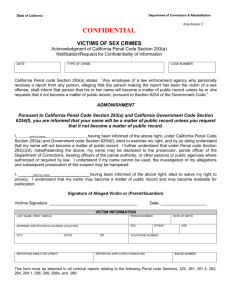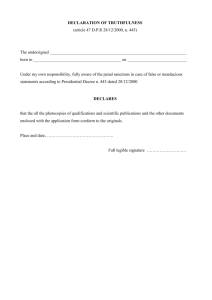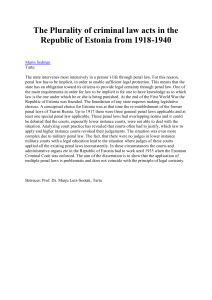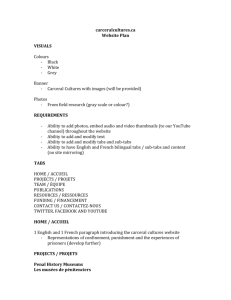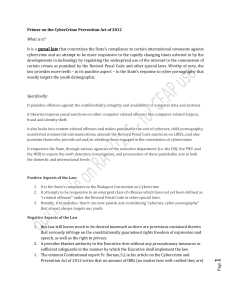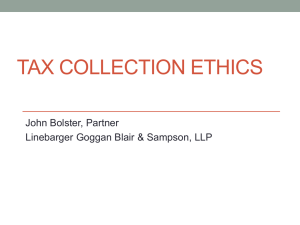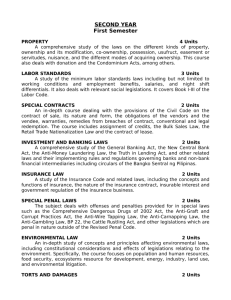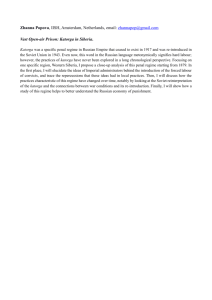Statements against Penal Interest: A New
advertisement
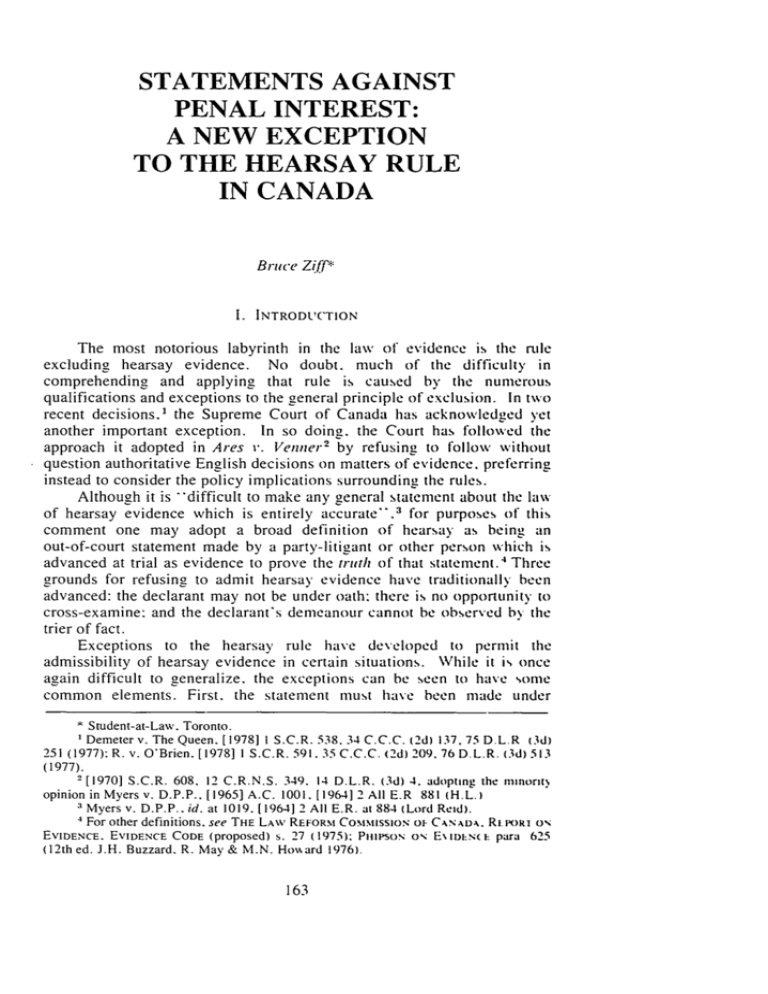
STATEMENTS AGAINST PENAL INTEREST: A NEW EXCEPTION TO THE HEARSAY RULE IN CANADA Bruce Ziff* I. INTRODUCTION The most notorious labyrinth in the law of evidence is the rule excluding hearsay evidence. No doubt, much of the difficulty in comprehending and applying that rule is caused by tile numerous qualifications and exceptions to the general principle of exclusion. In two recent decisions.' the Supreme Court of Canada has acknowledged yet another important exception. In so doing. the Court has followed the approach it adopted in Ares v. Venner 2 by refusing to follow without question authoritative English decisions on matters of evidence. preferring instead to consider the policy implications surrounding the rules. Although it is "difficult to make an, general statement about the law of hearsay evidence which is entirely accurate"." for purposes of this comment one may adopt a broad definition of hearsay as being an out-of-court statement made by a party-litigant or other person which is advanced at trial as evidence to prove the truth of that statement.' Three grounds for refusing to admit hearsay evidence have traditionally been advanced: the declarant may not be under oath: there is no opportunity to cross-examine: and the declarant's demeanour cannot be observed by the trier of fact. Exceptions to the hearsay rule have developed to permit the admissibility of hearsay evidence in certain situations. While it is once again difficult to generalize, the exceptions can be seen to have some common elements. First. the statement must have been made Linder * Student-at-Law. Toronto. Demeterv. The Queen. [19781 I S.C.R. 538.34 C.CC. (2d) 137.75 D.L.R t3d) 251 (1977): R. v. O'Brien. [1978] I S.C.R. 591.35 C.C.C. (2d) 209.76 DL.R, (3d) 513 (1977). 2 [1970] S.C.R. 608. 12 C.R.N.S. 349. 14 D.L.R. (3d) 4. adopting the innoritN opinion in Myers v. D.P.P.. [1965] A.C. 1001.[19641 2All E.R 881 (H.L.) Myers v. D.P.P.. id. at 1019. [19641 2 All E.R. at 884 (Lord Reid). For other definitions, see THE LAWk, REFORM COMMISSION Of- CAN ADA. Ri- 'ORI ON, EVIDENCE. EVIDENCE CODE (proposed) s. 27 (1975): PIHISON ON E\ toimN L para 625 (12th ed. J.H. Buzzard. R. May & M.N. Ho\%ard 1976). ' Ottawa Law Review [Vol. 11:163 circumstances which commend its trustworthiness. Secondly, there must be a dearth of other relevant evidence and the declarant must be unavailable to testify in person. Finally, the declarant must have been in possession of special knowledge of the facts asserted; the statement must not be of a self-serving nature; and generally the statement must have been made before the dispute or litigation arose. II. DECLARATIONS AGAINST INTEREST An out-of-court declaration which is against the pecuniary or proprietary interest of the declarant has long been accepted as admissible evidence as an exception to the hearsay rule. Confidence is placed in the probable trustworthiness of such statements primarily because it is assumed that one would not concede the existence of such a detrimental fact unless it were true. A second closely related reason is the improbability that one would consciously make an unfavourable statement falsely. 6 The courts in Commonwealth jurisdictions have limited this exception to declarations admitting a liability of the declarant to another, defeating a claim of the declarant, or affecting an interest in land and chattels. Those courts have refused to treat declarations against penal7 interest on the same footing and have invariably refused to admit them in evidence. Thus A may testify thatX admitted owing five dollars to Y, but not that X admitted killing Y (assuming, of course, thatX is unavailable to testify in person and one is left with only a hearsay account of his declaration). The infamous Sussex Peerage decision was the first to formalize the distinction between declarations against pecuniary or proprietary interest on the one hand and declarations against penal interest on the other, ruling that hearsay evidence in the latter category was inadmissible: To say if a man should confess a felony for which he would be liable to prosecution, that therefore, the instant the grave closes over him, all that was said by him is to be taken as evidence in every action and prosecution against another person. is one of the most monstrous and untenable propositions that can be advanced. 8 Although this case has been criticized repeatedly, it was not until recently that the Supreme Court of Canada in Regina v. O'Brien9 finally admitted 5 See, e.g., Sugden v. Lord St. Leonards, I P.D. 154, at 241, 34 L.T. 372, at 383 (C.A. 1876) (Jessel M.R.). 6 Note. 9 VAL. U.L. REV. 421, at 422 (1975); Jefferson, Declarations Against Interest: An Exception to the Hearsay Rule, 58 HARV. L. REV. I, at 8 (1944). However, Wigmore and Morgan have rejected this second proposition: see 9 VAL. U.L. REv. 421. at 422 n. 7. 7I.e., a statement wherein the declarant either confesses to a crime or presents or alludes to evidence which may lead to a criminal conviction. 8 The Sussex Peerage, II Cl. & F. 85, at I11, 8 E.R. 1034, at 1045 (H.L. 1844) (Lord Brougham). 9 [1978] 1 S.C.R. 591, 35 C.C.C. (2d) 209, 76 D.L.R. (3d) 513 (1977). 1979] Statements Against Penal Interest declarations against penal interest to the list of exceptions to the hearsay rule. III. THE DEMETER CASE: EMERGENCE OF A NiEW EXC1-l1 ION The landmark decision in O'Brien was the culmination of prior judicial examination of declarations against penal interest by both the Ontario Court of Appeal and the Supreme Court of Canada in Demeter v. The Queen. 1" a case which has enjoyed enormous public notoriety. In Demeter the accused was charged with having murdered his wife through the agency of "'persons unknown". The defence alleged inter alia that a nefarious individual named Eper (who was apparently unconnected with the accused) 11 had confessed to a long-time partner in crime, one Dinardo. that he had killed Christine Demeter. According to Dinardo. Eper told him that he had been hired by Mrs. Demeter to kill her husband. When Eper came to collect his fee an argument erupted in the course of which Mrs. Demeter was fatally attacked with a metal bar. At the time of the alleged confession Eper was an escaped convict who had been servint a life term in a federal penitentiary. He was killed in a gun battle with Toronto Police before Demeter came to trial. It was evident that Dinardo would not have betrayed his friend's confidence by revealing his statement were Eper still alive. It is equally clear that had Eper's hearsay confession been believed, the accused would have been exonerated. Predictably, the trial judge refused to admit Eper's confession on the basis of Sussex Peerage even though other evidence supporting the defence theory that Eper had committed the crime had been left with the jury. 12 While the Ontario Court of Appeal and the Supreme Court of Canada affirmed the trial judgment. they excluded the confession on other grounds. In so doing they laid the foundation for the new exception to the hearsay rule which subsequently emerged in O'Brien. The Ontario Court of Appeal in Demeter stated that it \ as not bound by Sussex Peerage and that there was no binding Canadian authority on point. However. on the facts of the case before them, the court did not think it "'necessary or propitious" 3 to settle the law. Nonetheless the court went on to elaborate on the criteria upon which the admissibility of a 10[1978] 1 S.C.R. 538. 34 C.C.C. (2d) 137. 75 D.L.R. t3d) 251 (1977). tiffg 10 O.R. (2d) 321 (C.A. 1975). " This point does not appear to have been seriously disputed although a piece of paper was found in Eper's apartment with the notation: "The president. Peter Demeter. Eden A.C.R. Associates. 3101 Bathurst. Ph. 787-5156." See Appellant's Factum to the Supreme Court of Canada at 23. See also R. v. Demeter. 10 0. R. (2d) 321. at 337. 25 C.C.C. (2d) 417. at 433. 12 Dinardo testified that he and Eper had met with Mrs. Demeter to discuss the plan to murder her husband. In charging the jury. the trial judge indicated to them that the story was suspect especially when related by a man of such dubious character as Dinardo R. v Demeter. supra note II. at 331. 25 C.C.C. (2d) at 427. 3 Supra note II. at 343. 25 C.C.C. (2d) at 439. Ottawa Law Review [Vol. 11:163 hearsay declaration against penal interest might be determined. The prime requisite would be meeting the traditional requirements for an admissible declaration against pecuniary interest. These common law rules (not articulated in the Court of Appeal judgment but listed by the Supreme Court) are as follows: I. It is essential that the deceased should have made a statement of some fact. of the truth of which he had peculiar knowledge. The rule applied only to statements as to "'acts done by the deceased and not by third parties" (per Sir R. Phillimore in The Henry Coxon (1878) 3 P.D. 156, 158). It does not extend to cover statements made by a deceased person of what others had told him (Tindal C.J. and Lord Campbell in Lord Trimlestown v. Kenmis (1843) 9 Cl. & F. 749. 780. 785). 2. It is essential that such fact should have been "to the deceased's immediate prejudice", that is against his interest at the time when he stated it. If it may be construed for his interest or against it (Massey %'.Allen) (13 Ch. D. 558) or may only be against his interest in certain future events (Ex parte Edwards) (14 Q.B.D. 415) it is inadmissible."1 3. It is essential that the deceased should have known the fact to be against his interest when he made it, because it is on the guarantee of truth based on a man's conscious statement of a fact, "'even though it be to his own hindrance*, that the whole theory of admissibility depends. It is "a necessary element, that the subject-matter of the declaration . . . must have been within the direct personal knowledge of the person making the declaration" (per Lord Selborne L.C. in Sturla v. Freccia (1880) 5 App. Cas. 623, 633): "to support the admissibility it must be shewn that the statement was, to the knowledge of the deceased, contrary to his interest" (per Fletcher Moulton L.J. in Tucker 1'. Oldburv Urban Council (1912) 2 K.B. 317. 321 ). 4. It has long been held that the interest to which the statement must be advere must be a pecuniary one or, which is only a species of the same genus. a proprietary one. A statement would not be against interest if only generally criminatory. one "which might in some way or other injuriously affect the interest of the party" (per Lord Lyndhurst L.C., Lords Brougham and Denman in the Sussex Peerage Case (I I Cl. & F. 85, 110, 111)) or which might be prejudicial to reputation or social consideration. 15 In addition, the Court of Appeal indicated that five further requirements would have to be met: I. The declaration would have to be made to such a person and in such circumstances that the declarant should have apprehended a vulnerability to penal consequences as a result. In Sussex Peerage the Lord Chancellor would not have admitted the declaration in any event of the rule because it was made to the declarant's son. In ordinary circumstances where a declaration is made for instance to an unestranged son, wife or mother, the psychological assurance of reliability is lacking because of [sic] risk of penal consequences is not real and the declarant may have motives such as a desire for self-aggrandizement or to shock which makes the declaration unreliable. 4 The quantum of interest appears to be irrelevant. In Gormley v. Canada Permanent Trust Co., [1969] 2 O.R. 414, 5 D.L.R. (3d) 497 (H.C. 1968), King J. admitted a hearsay declaration of an agreement to pay $4.00! iSDemeter v. The Queen, supra note 10, at 545, 34 C.C.C. (2d) at 141-42. 75 D.L.R. (3d) at 255-56 citing Ward v. H.S. Pitt & Co.; Lloyd v. Powell Duffryn Steam Coal Co., [1913] 2 K.B. 130, at 137-38, 108 L.T. 201, at 203 (C.A.). The Supreme Court of Canada also indicated that the fourth requirement might properly be eliminated in the case of penal declarations. 19791 Statements Against Penal Interest 2. The vulnerability to penal consequences %% ould ha%e to be not remote 3. ". . . the declaration sought to be given in e%idence must be considered tn its totality. If upon the whole tenor the weight is in fasour of the declarant. it is not against his interest".6 Re Van Beelen. p. 208: R. .1gawa (an unreported judgment of this Court). 1 4. In a doubtful case a Court might properly consider s hether or not there are other circumstances connecting the declarant N% ith the crime and \%lhether or not there is any connection between the declarant and the accused. 5. The declarant would have to be unavailable by reason of death. insanity. grave illness which prevents the giving of testitnon even from a bed. or absence in ajurisdiction to which none of the processes of the Court extends A declarant would not be unavailable in the circumstances that emtsted in R Agawa. 17 While the Court of Appeal treated these two lists as complementarN , it is submitted that simple logic precludes the necessity for a pecuniary and a penal interest to be present. On the facts, the Ontario court held that Eper's statement did not satisfy the penal interest criteria. There was no vulnerability to penal consequences because the confession was made to a close friend %%ho would not likely "'spill the beans*'. It was also held that the potential penalty was too remote. Eper was already serving a life term: the only additional penalty would be a possible delay in parole. Counsel for the accused argued in the alternative that the statement was made againstpecuniary interest in that Eper had subjected himself to a possible action for damages under The Fatal Accidents Act. 8 In a curt response the court adopted a passage from the recent Australian case of In re Van Beelen: Declarations against pecuniar\ interest anmounting to a confession of criminal fraud, remain declarations against pecuniar\ interest: but as ai matter of sylloeistic logic. it cannot be concluded from that proposition that .ill confessions of crime are declarations against pecuniar\ interet Where a person makes a declaration against penal interest, not directly concerned %% ith his pecuniary or proprietar\ interests. v, hat may reasonably be espected to be. uppermost in his mind is that he is confessimg to a crime He may or na\ not have the imagination to'consider. or the resolution to %%eigh. all the fikl, consequences of confessing to a crime. among \.hich are often to be found. 16 R. v. Agawa has since been reported in II OR. (2d) 176. 28 C C C (2d) 379. 31 C.R.N.S. 293 (C.A. 1975). 17 R. v. Demeter. supra note II. at 343-44. 25 C.C.C. (2d) at 439-40 " R.S.O. 1970. c. 164. Statements admitting tortious liability hase been admitted under the rubric of the pecuniary interest exception. Like\%ise. a declaration b\ an injured person absolving a potential tortfeasor from liability has been allo% ed under the exception For example. in Watt v. Miller. [ 1950] 2 W.W.R. 1144. [19501 3 D.LR. 709 (13 C S C ). a statement by an injured passenger that the driver had driven in a safe tmanner %%as admissible (although hearsay) because it reduced severely his chances of succeeding in an action for damages. One could also argue that since a conviction ordinarily involses sonle economic deprivation, a penal statement would necessarily also be a pecuniar, statement This is particularly so when a jail term is imposed. because the earning capacity of the accused would be thereby limited. Similarly. could it not be argued that confession to an\ crime where a fine may be imposed is a statement against pecuniary interest" A crime %%herean order of restitution is possible would also qualify Ottawa Law Review [Vol. 11:163 sooner or later, some impairment of the offender's assets: but it would, in our opinion, flout common sense and every day experience to suppose that the primary mental obstacle that is overcome when an offender is constrained by the force of circumstances to acknowledge his guilt is his awareness that his pecuniary or proprietary interests will somehow be affected by a confession. "' One may certainly question the logic of this reply. On the one hand, the Court of Appeal denied that Eper apprehended criminal vulnerability. On the other hand, they adopted the reasoning of the Australian court that the presence of criminal retribution "uppermost" in the mind of the declarant negates the importance of any pecuniary consideration. If, as the court found, Eper had not feared criminal sanctions, then surely there was room to examine possible pecuniary disadvantage. On appeal, the Supreme Court of Canada likewise refused to admit the confession. The judgment, delivered on May 31, 1977, contains passages which proved to be of great relevance to the O'Brien decision which was to follow in less than a month's time. Martland J. referred to the five criteria suggested by the Court of Appeal stating: "These furnish a valuable guide for consideration in the event that this Court should determine that a declaration against penal interest is not to be held inadmissible under the rule against the reception of hearsay evidence. " 20 He then went on to list the common law rules respecting the admission of declarations against pecuniary or proprietary interest."1 Adopting the reasoning of the Court of Appeal that these rules must be satisfied before the proposed new criteria could even be considered Mr. Justice Martland held: [Tlhe confession in this case does not meet the requirement numbered 3. There is nothing in the evidence to show that when Eper made his statement to Dinardo that he apprehended or had any cause for apprehension that it was contrary to his interest, either penal or pecuniary.2 IV. THE O'BRIEN CASE: THE EXCEPTION STATED On June 24, 1977 the Supreme Court of Canada in Regina v. O'Brien finally interred Sussex Peerage and established a new Canadian exception to the hearsay rule: There is little or no reason why declarations against penal interest and those against pecuniary or proprietary interest should not stand on the same footing. A person is as likely to speak the truth in a matter affecting his liberty as in a matter affecting his pocketbook. For these reasons and the ever-present possibility that a rule of absolute prohibition could lead to grave 1 9 S.A.S.R. 163, at 228 (S.C. 1974). Demeter v. The Queen, supra note 10, at 545, 34 C.C.C. (2d) at 141, 75 D.L.R. (3d) at 255. (Judson, Ritchie, Pigeon, Dickson, Beetz and de Grandpr6 JJ. concurred with Martland J. Spence J.(Laskin C.J.C. concurring) expressed a separate opinion while agreeing with the majority decision.) 21 See text accompanying note 15, supra. 22 Demeter v. The Queen, supra note 10, at 546, 34 C.C.C. (2d) at 142, 75 D.L.R. (3d) at 256 (emphasis added). This appears to be an implicit rejection as well of counsel's argument based on The Fatal Accidents Act. 20 1979] Statements Against Penal Interest injustice I w,,ould hold that. in a proper case, a declaration against penal interest is admissible accordine to the la%% of Canada. the rule as to absolute exclusion of declarations against penal2 3 interest. established in The Sutex Peerage case. should not be follossed. O'Brien involved an appeal by the Cro\%n from an acquittal enered by the British Columbia Court of Appeal. As in Demeter. the facts are somewhat sensational. In April 1974. O'Brien %%as convicted of possession of drugs for the purpose of trafficking. An appeal %%as launched. Before that hearing. one Jensen contacted O*Brien's la%%,er. Sidney Simons, and confessed to being the sole perpetrator of the crime. Jensen agreed to testify to this effect (assuming that leave %%ould be granted to enter new evidence on appeal) on the understanding that he would seek the protection of section 5(2) of the Canada Evidence Act."4 Unfortunately. Jensen died of a drug overdose before the hearing. At the appeal. Simons was permitted by the British Columbia Court of Appeal to testify as to the confession. In admitting the evidence. McFarlane J.A. ruled: The evidence is given to sho, that it s,,ould be dangerou, in the circumstances to allow the con\ iction to stand, that c\ idence not ha\ Ing been available at the trial. It is not to pros e the truth of Jensen', statements to Mr Simons - and. of course, it could not be e\idence as to that It is for a different purpose and. therefore, in mn,\ie it isnot heara, :- Dickson J. speaking for the Supreme Court. rejected McFarlane J.A.'s characterization of the evidence. In Dickson J.'s vie\% it was offered for the truth of its contents: only on that basis could it raise a reasonable doubt as to the guilt of O'Brien. Simons' testimony \\as clearly hearsay. and unless it fell within the hearsay exceptions. it had not been properly admitted by the Court of Appeal. Consequently. the Supreme Court was forced to face squarely the issue of \%hether declarations against penal interest constituted a valid exception. As noted previously. Mr. Justice Dickson stated that in a proper case, declarations against penal interest would be admissible. Ho\%ever. on the facts the Court held that Regina v. O'Brien \\as not such at "'proper" case. Referring to the first and second principles enunciated b\ the Court of Appeal in Deneter 6 Dickson J,took the view that Jensen had no real apprehension of immediate penal consequences: In the case at bar. Jensen did not make hi% declaration of guilt unld tel months after the respondent had been cons icted and sentenced and not until almost six months after the charges \shich he himself faced had been 27 stayed. 23 Supra note9. at599.35 C.C.C. (2d) at214.76 D.L.R. (3d) at518-19 (Dickson J. for the full Court). 24 R.S.C. 1970. c. E-10. 21 Case on Appeal, Proceedings in Court of Appeal at 157 (B.C 1975). 2 6 See text accompanying note 17. supra. 27 .A.Sept. 16. R. v. O'Brien. supra note 9. at 600. 35 C.C.C. (2d) at 215.76 D.L R. (3d) at 519- Ottawa Law Review [Vol. 11:163 Mr. Justice Dickson also found that the requirement that an y declaration against interest must be to the "deceased's immediate prejudice" 8 had not been met. The confession had been made in circumstances which indicated that Jensen wished to avoid prejudice to himself while at the same time exonerating O'Brien. He spoke in the privacy of a lawyer's office and only on the understanding that were this evidence given in court it would not be used against him in a subsequent trial. The Court suggested that Jensen spoke without fear of repercussion. One wonders if the conclusion would have been different if it could have been shown that Jensen had considered the possibility that Mr. Simons might turn him over to the police before the hearing. The decision in O'Brien is suspect for other reasons. Dickson J. referred inter alia to the following factor in rejecting the statement: it had been made ten months after O'Brien's conviction and at a time when the charges against Jensen had been stayed. It is difficult to understand how this could have been important. Mr. Justice Dickson also raised the question of whether, in any event, Mr. Simons was a competent witness. He did not resolve this question because no considered submission was addressed to this point. In fact, counsel for the accused cited three American decisions 9 in which the defendant's attorney had testified as to the out-of-court confession of a third party. Furthermore, the respondent cited Schneider v. Leigh3" where it was held that statements made to a lawyer about a client are privileged qua the client only, so that a third party (in this case Jensen) has no claim to privilege. Presumably, the Court was not impressed by the force of these submissions. It is suggested that there is no rule of evidence rendering Simons incompetent. At most the Crown could attack his credibility by suggesting bias or interest. As a matter of policy and ethics, Mr. Simons should not have continued as defence counsel. Apart from the questionable application of the law to the facts, the reasoning in Regina v. O'Brien which led to the decision to recognize another exception to the hearsay rule is supported by meagre authority. Rather inconsequential propositions were tendered by the Court in support of its holding on the hearsay rule. It was argued that before the Sussex Peerage case, the exception had been broadly stated by the English courts, encompassing statements made against interest gener3 ally. Thus, for example, in the 1833 decision of Powell v. Harper, 1 hearsay evidence of a confession was accepted to prove that the declarant had committed larceny. While the Sussex Peerage principle was adopted "Ild., at 601, 35 C.C.C. (2d) at 216, 76 D.L.R. (3d) at 520. This is a reference by implication to the Court's own criterion 2 in Demeter: see text accompanying note 15, supra. "9See Additional Memorandum to Respondent's Factum citing Pennsylvania v. Hackett, 225 Pa. Super. Ct. 22, 307 A. 2d 334 (1973); Chambers v.Mississippi, 252 So. 2d 217 (Sup. Ct. 1971); New York v. Brown, 26 N.Y. 88, 257 N.E. 2d 16 (Ct. App. 1970). 30 [195512 Q.B. 195, [1955] 2 All E.R. 173. 31 5 Car. & P.589, 172 E.R. I112 (1833). 1979] Statements Against Penal Interest in the United States in Donnelly' v. United State.s .32 Dickson J. noted that a number of recent decisions have undermined DonnellY' and that in some states declarations against penal interest have been readily allowved. The Court also referred to American legal scholars \\ho have criticized the 33 Sussex principle. Looking behind the leading English case to earlier decisions, and citing American cases and authors is not the usual Inodts operandi of the Supreme Court of Canada. In rejecting Sussex Peerage the Court is really acknowledging that the old rule is not consonant with common sense. The authorities cited thus become no more than a weak rationalization for the conclusion reached: they serve only to dissipate the judicial insecurity arising from a decision to reject authoritative English case law. V. CONIt:NT Settling the law on the basis of first principles and eliminating the arbitrary and tenuous "'" distinction between pecuniary and penal interests would appear commendable had the Supreme Court of Canada not lacked the courage of its convictions while stating that the distinction between penal and pecuniary interests was 'arbitrary and tenuous" they insisted on a much more stringent test for the former, based on the requirements set out by the Court of Appeal in Demeter. Academic opinion is decidedly against the traditional penal interest prohibition. 35 Wigmore, the most vehement critic, has called Sussex Peerage a backward step, an arbitrary limitation and a bad rule. 36 Morgan referred to the case as one inflicting an illogical and frequently barbarous rule on the law of evidence. 37 Although Wigmore maintains that the rule cannot be justified on policy grounds, he and others have 32 228 U.S. 243. 33 S. Ct. 449 (1913). ' R. v. O'Brien, supra note 9. at 597-98.35 C.C.C. (2d) at213-14.76 D L R (3d) at 517-18. See generally text accompanying notes 35-37. infra. 34 1d. at 599, 35 C.C.C. (2d) at 214. 76 D.L.R. (3d) at 518. 1 The following is a sampling of the American writers who disapprove of the prohibition: McLennan. Note, 10 N. CAROLINA L. REV. 84. at 86 (1932): Note. 36 YAI E L.J. 119, at 123 (1926); Jefferson. DeclarationsAgainst Interest: An Exception to the Hearsay Rule, 58 HARV. L. REV. 1. at 39-40 (1944); Morgan. Declarations Against Interest in Texas, 10 TEXAS L. REV. 399. at409 (1932). Mabry. Note. 20 RocK MNs, L REV. 97. at 97-98 (1947): Helein. DeclarationsAgainst Penal Interests as an E.tception to the Hearsay Rule, 7 SAINT Louis U.L.J. 335. at 345-46 (1963); Hack. Declarations Against Penal Interest: Standards of Admissibility Under an Emerging Majormt Rule. 56 BOSTON U.L. REV. 148, at 179 (1976): Morgan. DeclarationsAgainst Interest. 5 VAND L. REV. 451, at475 (1952); Note. 61 W. VIRGINIA L. REV. 149. at 151 (1959). Stock%%ell. Evidence: DeclarationsAgainst a PenalInterest -A Pleafor Parity. 5 TL'LSA L.J 302. at 313 (1968). But see Note. Evidence-DeclarationAgainst Penal Interest Excepteon to HearsavRule. 12 DE PAUL L. REV. 323. at 329 (1963). 36 5 WIGMORE. EVIDENCE para. 1476 (Chadbourne rev. 1974). 17 Morgan, Note, 10 TEXAS L. REV. 399. at409 (1932). Ottawa Law Review [Vol. 11:163 suggested elements which may explain its rationale. The prime reason for exclusion goes to the heart of the hearsay rule itself-there is a fear of abuse by encouraging fabricated testimony. One American author maintains: "If the confession of every crackpot . . . were held to be admissible, the issues before the jury would become a hopeless morass."38 The recognition of a penal interest exception raises some issues which were not satisfactorily explored by the Supreme Court of Canada in either Demeter or O'Brien. Declarations against penal interest are often motivated by extraneous considerations. There may be some motive to falsify, such as a desire to avoid punishment for a greater offence by admitting guilt for a less serious one, a desire to frustrate the criminal process, or a willingness to "take the rap" for a criminal colleague (for which there might be due compensation). However cogent these considerations may be, there is little to suggest that they do not apply with equal force to statements against pecuniary or proprietary interest. One is reminded of Lord Hamilton's observation in Ward %'.Pitt that, "Men lie for so many reasons", 39 and often in spite of their financial interests. If, as the Court indicated, "[a] person is as likely to speak the truth in a matter affecting his liberty as in a matter affecting his pocket-book", 4 ° it is difficult to see why it is necessary in doubtful cases involving penal statements to consider other circumstances connecting the declarant with the crime. Furthermore, a penal consequence which is too remote will not do. What if A admits owing an old debt to B, which B (unbeknownst to A) is not likely to pursue. As long as A apprehends liability his statements as to the debt are relevant. Yet if he fears unlikely (or remote) penal consequences, his relevant admissions are excluded. In selecting the tests for admissibility of declarations against penal interest the Supreme Court of Canada could well have looked to American authorities for guidance. A brief survey of various American solutions to this problem indicates some of the alternatives which were available to the Court and which remain possible as legislative reform. Twenty-one American states now admit declarations against penal interest, and as a corollary a number of "special circumstance" rules have developed. The trend, if one may be discerned, is to require corroboration. For example, the new Federal Rules of Evidence now read in part as follows: "A statement tending to expose the declarant to criminal liability and offered to exculpate the accused is not admissible unless corroborating circumstances clearly indicate the trustworthiness of the statement." 4 1 In Texas, a three point rule exists. First, there must be 38 39 Note, 12 DE PAUL L. REV. 323, at 329 (1963). Supra note 15, at 138, 108 L.T. at 203. 40 R. v. O'Brien,supra note 9, at 599, 35 C.C.C. (2d) at 214,76 D.L.R. (3d) at 518. "1 FED. RULES EVID. Rule 804(b)(3), 28 U.S.C.A. (West 1975). Rule 104(a) requires the judge to make a preliminary finding of corroboration before the statement is admitted or heard by the jury. Statements Against Penal Interest 1979] a risk of convicting an innocent man. Secondly. the declaration must exculpate the accused. Thirdly. the person making the statement muLst have been so situated. that he might have committed the crime. 4 2 In Ne%% Jersey. similar rules obtain, although the cases speak of a need for cogent evidence. 4" In Dyson v. Maryland it was held that a third party confession should be received and considered unless it is "clearly collusiVe, frivolous or otherwise obviously untrustworthy"."' The relationship of the declarant to the recipient of the statement has been considered in American jurisprudence. In Demeter this relationship was extremely damning. Comparable American cases, however. have held statements to be admissible even where made to a close acquain45 tance. In at least two American cases it has been held that refusal to admit hearsay evidence may violate the entrenched constitutional right to due process of law. In Pennsylvania v. Hackett.4 6 an out-of-court confession, made to a member of the State bar was held to be admissible on this basis. The Pennsylvania court was relying on a similar decision of the United States Supreme Court in Chambers v.Alissi.%sippi. 47 In %ie\%of the manner in which the Canadian Bill of Rights has been emasculated by the judiciary, it is doubtful whether such an argument would be advanced in this polity. The American courts have also expanded the meaning of the "unavailability" requirement. In Sutter v. Ea.terrl\"48 a %%itness \1ho refused to testify on the grounds of self-incrimination was held to be the Court of unavailable. Furthermore. in New Jersey v. Sejuelas. Appeal held that a hostile witness was unavailable for the purposes of the rule. In contrast, in Regina v. Agawa 5" the Ontario Court of Appeal held that a person is not unavailable merely because he invokes his right as a co-accused not to testify. There is a hint in the American jurisprudence that statements w.hich create a risk of rendering the maker an object of hatred. ridicule and 42 See Cameron v. Texas. 153 Tex. Crim. 29. 217 S.W. 2d 23 (Crim. App 1949) See also Morgan. Note. supra note 37. 43 E.g.. New Jersey v. Sejuelas. 94 N.J. Super. 576. 229 A. 2d 659 (App Div 1967). " 209 A. 2d 609, at 614 (Ct. App. 1965). See also Simpson. The Admisson Into Evidence of Extra-JudicialConfession of Guilt Made by"Third Parries. 23 M ARt tLtND L 172. at 178. 108 N.E. 2d 488. at 492 (Sup. REV. 178 (1963). In Illinois v. Lettrich. 413 I11. Ct. 1952) an even looser test was formulated. The court held that the rule against is obvious that justice demands a departure" admissibility could be broken where "'it 581. 465 P. 2d 560 (Sup. Ct. 1970) v. Leong. 51 Haw. "SE.g., Hawaii 46 Supra note 29. 47 Id. 4 354 Mo. 282. 189 S.W. 2d 284 (Sup. Ct. 1945). See also Nev, York %,.Brov n. supra note 29. In California v. Spriggs. 60 Cal. 2d 868, 389 P. 2d 377 (Sup. Ct. 1964) it was stated obiter that unavailability was not required. This case has been overruled in California by statute. See CAL. EvID. CODE s. 1230. Comment p. 211 (West 1966). 49 Supra note 43. 50 Supra note 16. Ottawa Law Review [Vol. 11:163 social disgrace in the community should also be admissible. In Idaho v. Alcorn5 1 it was held that statements inconsistent with the observance of chastity should be let in on this basis. This exception has also been incorporated in the American Model Code of Evidence. 5" VI. CONCLUSION It is not insignificant that in both Demeter and O'Brien the penal exception was accepted but not invoked. The significance rests not on any diminished judicial weight, but rather on the apparent jealousy with which the newly-formed exception was guarded. It would appear from these decisions that a formidable list of requirements would have to be met before any declaration against penal interest would in fact be admitted. In addition, the Court gave little guidance as to what circumstances or fact pattern might possibly constitute a proper case for admissibility. The recent case of Regina v. Pelletier53 has perhaps served to place in perspective some of the concerns arising from the Demeter and O'Brien decisions. The accused, Pelletier, on trial for manslaughter. attempted to have received in evidence a statement made to the police by one Antoine David wherein David admitted to the assault which resulted in the victim's death. At the time of making this declaration David had himself been charged with manslaughter although his statement indicated that he might have been acting in self-defence. The charge against David was withdrawn prior to the preliminary inquiry; David disappeared and a new manslaughter charge was brought against the accused. Pelletier. David and the deceased had all been friends. The incident in question occurred in a rooming house where the three men shared quarters. At trial, the judge refused to admit David's confession. On appeal, the Ontario Court of Appeal, referring to both Demeter and O'Brien, ruled that the declaration was properly admissible, quashed the conviction and ordered a new trial. The importance of the Pelletier case lies in the court's treatment of the pre-conditions for admissibility of declarations against penal interest. Of the nine possible criteria the court stated that only numbers 3 and 5 from its own list in Demeter 54 required consideration. With respect to the requirement that the declaration be against interest on the totality of the evidence, the court held that the element of self-defence did not 5"7 Idaho 599, 64 P. 1014 (Sup. Ct. 1901). But see United States v. Dovico, 380 F. 2d 325 (1967)52 AMERICAN LAW INSTITUTE, MODEL CODE OF EVIDENCE, Rule 509(l) (1942). The United States Supreme Court proposed the identical "social disgrace" clause for inclusion in Rule 804(b)(3) of the Federal Rules of Evidence, supra note 41, but the passage was deleted by Congress. 53 38 C.C.C. (2d) 515 (Ont. C.A. 1978). 54 See text accompanying note 17, supra. 1979] Statements Against Penal Interest deprive the confession of its character of being against interest. Moreover. the court even considered the value of the confession to the accused since the evidence against him was only circumstantial. The fact that David could not be found to testify despite diligent inquiry was held to be sufficient to satisfy the unavailability requirement. It is interesting to note that the court made no comment on the pecuniary interest requirements or on the close relationship between the declarant and the accused or the recipient of the statement. The Supreme Court of Canada in Demeter referred to the criteria established by the Ontario Court of Appeal in that same case as a "valuable guide"."s The judgment in Pelletier likewise refers to this comment. 5 In view of Pelletier it may well be that the admissibility of declarations against penal interest \%ill depend on the merits of each case rather than any application of the rigid formula which Demeter and O'Brien seemed to suggest. "See text and note 20. supra. 51 R. v. Pelletier. supra note 53. at 525.
